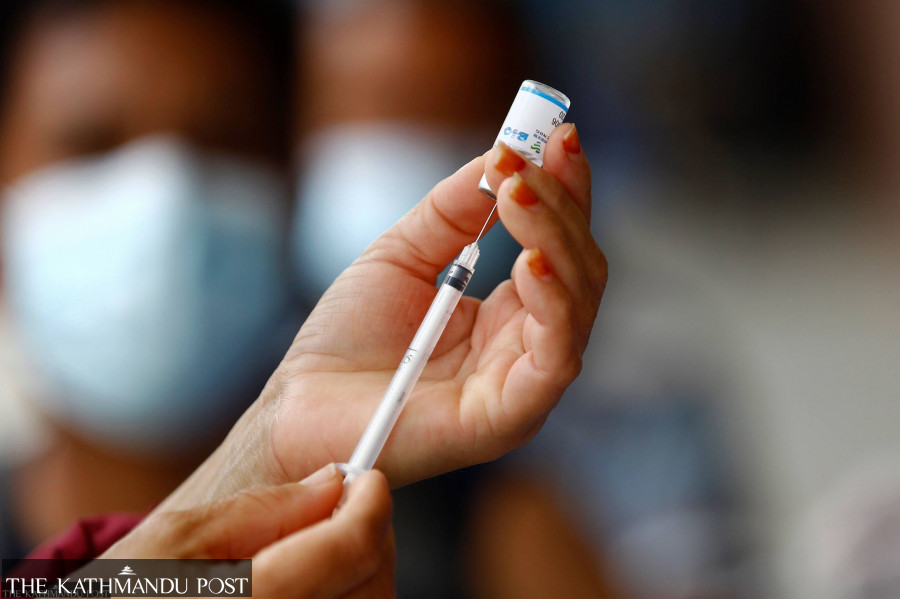Health
There are vaccines. But there could be syringe shortages
Availability of the safe injection equipment is crucial in fighting the pandemic that’s far from over.
Arjun Poudel
Province Health Logistic Management Centre, Biratnagar, currently has 312,000 doses of the Vero Cell vaccine in stock. But it has only 10,000 syringes.
The vaccination drive in the province could be affected if syringes are not supplied immediately, according to Chandra Kanta Thakur, chief of the centre.
Estimates suggest over 12 million doses of Covid-19 vaccines of various companies are in government stock throughout the county. But compared to the total doses, syringes are sufficient only for half the doses.
Officials say syringe supply is not a problem at present, as the government has already placed orders, but if consignments fail to arrive on time, the vaccination campaign may get affected.
“As of now, we do not have a shortage of syringes to continue the drive,” Dr Surendra Chaurasia, chief of the Logistic Management Section under the Department of Health Services, told the Post. “But if the syringe supply is delayed, it could cause a big problem.”
Standard 0.5ml auto-disable syringes are used for most Covid-19 vaccines and for routine immunisation, and 0.3ml syringes are used for the Pfizer-BioNTech vaccine.
After the pandemic began in December 2019 and the coronavirus started to spread across the world, it was a race against time for developed countries and pharmaceutical companies to find an antidote. Finally, when vaccines were approved, manufacturing started in billions of doses. Syringe manufacturers had to up their pace.
Chaurasia said that his office would have supplied syringes from the stock to provinces had the Department of Health Services been informed about the shortages. He added the department could have arranged for a reverse supply (supply syringes from the places where the stock is more) as well to address the shortage.
Officials said that COVAX facility, the United Nations backed international vaccine sharing scheme, supplies the syringes along with the vaccine, but for the vaccines procured or received in donations, the government needs to purchase syringes.
“Vaccine manufacturing companies do not produce syringes and we have to procure them separately,” Sagar Dahal, chief of the National Immunisation Programme, told the Post.
Experts say syringe shortage is a cause for concern as there is a crisis globally.
The United Nations Children’s Fund last month said that urgent action was needed to ensure sufficient Covid vaccine syringe supply to meet 2022 vaccination targets.
Increased demands, supply chain disruptions, and “syringe nationalism” could lead to significant challenges in 2022 without immediate action, according to UNICEF.
Rich countries, which have hoarded more doses than their requirement, have also stockpiled the desperately needed safe injection equipment.
“Without action now, the world could face a serious shortage of Covid vaccine syringes by the end of 2022, with potentially dire consequences for the global effort to bring the pandemic under control,” UNICEF warned.
India also faced a shortage of syringes, as the authorities there did not order sufficient syringes in advance.
Several countries around the globe have also experienced syringe shortages as they are in different stages of their vaccination drives.
Officials said that COVAX has supplied an equal number of syringes along with the vaccines. Some of the Vero Cell vaccines have been delivered preloaded in the syringes.
“We have drawn the attention of all concerned to the syringe shortages that we could face,” said Chaurasia.
The Ministry of Health and Population said that 5 million syringes will arrive on Friday and will be supplied to the provinces from Saturday.
“We have also procured additional 6.5 million syringes and have already paid for them,” said Dahal, chief of the National Immunisation Centre.
The government purchases syringes as per the needs of childhood immunisation programmes that are carried out regularly throughout the year.
The worldwide shortage of syringes is believed to have been caused by mass vaccination drives.
Experts say that the problems concerning arrangement of vaccines and syringes are purely management issues, which should be handled properly.
“Authorities should ensure sufficient syringes and do planning and procurement accordingly,” Bhogendra Dotel, former chief of the Logistic Management Section, told the Post. “As more doses are coming, officials should purchase the syringes in advance.”
Officials said that millions of doses of vaccines are in the pipeline.
The government has procured 10 million doses—6 million doses Pfizer-BioNTech and 4 million doses Moderna vaccine—from US firms, which are expected to be delivered soon.
Nepal so far has received 38,539,367 doses of various Covid-19 vaccines—Vero Cell, Covishield, AstraZeneca type, AstraZeneca, Moderna, Janssen and Pfizer and BioNTech.
As of Wednesday, 9,782,247 people or 32.2 percent of the total population have been fully immunised.
“To meet the target of vaccination and address new challenges, effective management and planning plays a crucial role,” said Dotel. “If the ongoing vaccination drive halts or slows down due to a syringe crisis, it will be a failure of agencies responsible for management and planning.”
Binod Bhandari contributed reporting from Biratnagar.




 17.9°C Kathmandu
17.9°C Kathmandu















